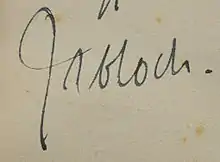Jean-Richard Bloch
Jean-Richard Bloch (May 25, 1884 – March 15, 1947) was a French critic, novelist and playwright.

He was a member of the French Communist Party (PCF) and worked with Louis Aragon in the evening daily Ce soir.[1]
Literary career
He became a professional writer in 1909, after having worked for two years in a high school as an aggregated teacher. By this time, he was already known as a left-leaning intellectual. In 1910 he launched L’Effort libre, a "review of revolutionary civilization".[2] He joined the French Army in World War One and was injured three times on the battlefields of the Marne and in Verdun. After the war, he felt remorse for having joined the army. He also suffered from neurosis caused by the horrors of war and by the premature death of his youngest daughter, Solange. It was during this time that Bloch traveled to Africa on the advice of a friend. His logbook made during this maritime voyage was published in newspapers and magazines of the period and was later serialized into a three volume book set.[3]
In 1937, he was responsible for organising Naissance d'une cité, a "popular spectacle" performed on 19 October as part of the Exposition Internationale des Arts et Techniques dans la Vie Moderne.[4]
Family life
André Maurois was his brother in law.[1]
Literary works
- A Publisher of "L'Effort Libre", 1910–1914 (left-wing literary magazine)
- Lévy, 1912
- ... et Compagnie, 1918 (novel)
- La nuit Kurde (novel)
- Sybilla, 1932 (novel)
- Carnaval est mort, 1920 (critic)
- A leader of "Europe" (with Jean Guéhenno)
- Offrande à la musique, 1930 (ballet)
- Destin du siècle, 1931
- Naissance d'une culture, 1936
- Toulon (a play)
- De la France trahie à la France en armes, 1949
References
- "Bloch, Jean–Richard - Dictionary definition of Bloch, Jean–Richard | Encyclopedia.com: FREE online dictionary". www.encyclopedia.com. Encyclopedia.com. Retrieved 20 March 2018.
- "Jean-Richard Bloch, French writer". Encyclopedia Britannica. Retrieved 20 March 2018.
- Yoshizawa, Hideki (2015). "L'après-guerre chez Jean-Richard Bloch dans Première journée à Rufisque (1926): Incarnation du prolétariat chez les Africains subsahariens" [The postwar period at Jean-Richard Bloch's First Day at Rufisque (1926): Incarnation of the proletariat among Sub-Saharan Africans]. Études de Langue et Littérature Françaises (in French). 107: 137–152. doi:10.20634/ellf.107.0_137.
- Green, Christopher (2003). Art in France, 1900-1940. Yale University Press. ISBN 0300099088. Retrieved 16 March 2018.